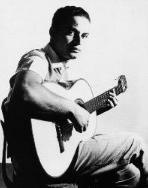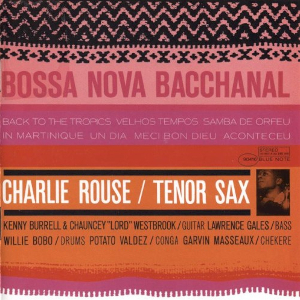Related Research Articles

Bossa nova is a relaxed style of samba developed in the late 1950s and early 1960s in Rio de Janeiro, Brazil. It is mainly characterized by a calm syncopated rhythm with chords and fingerstyle mimicking the beat of a samba groove, as if it was a simplification and stylization on the guitar of the rhythm produced by a samba school band. Another defining characteristic of the style is the use of unconventional chords in some cases with complex progressions and "ambiguous" harmonies. A common misconception is that these complex chords and harmonies were derived from jazz, but samba guitar players have been using similar arrangement structures since the early 1920s, indicating a case of parallel evolution of styles rather than a simple transference from jazz to bossa nova. Nevertheless, bossa nova was influenced by jazz, both in the harmonies used and also by the instrumentation of songs, and today many bossa nova songs are considered jazz standards. The popularity of bossa nova has helped to renew samba and contributed to the modernization of Brazilian music in general.

Baden Powell de Aquino, known professionally as Baden Powell, was a Brazilian guitarist. He combined classical techniques with popular harmony and swing. He performed in many styles, including bossa nova, samba, Brazilian jazz, Latin jazz and MPB. He performed on stage during most of his lifetime. Powell composed many pieces for guitar some of them now considered guitar standards, such as Abração em Madrid, Braziliense, Canto de Ossanha, Casa Velha, Consolação, Horizon, Imagem, Lotus, Samba, Samba Triste, Simplesmente, Tristeza e Solidão, and Samba da Benção. He released Os Afro-sambas, a watershed album in MPB, with Vinicius de Moraes in 1966. He's widely regarded as one of the greatest brazilian guitar players of all time.

Eumir Deodato de Almeida is a Brazilian pianist, composer, arranger and record producer, primarily in jazz but who has been known for his eclectic melding of genres, such as pop, rock, disco, rhythm and blues, classical, Latin and bossa nova.

Getz/Gilberto is an album by American saxophonist Stan Getz and Brazilian guitarist João Gilberto, featuring pianist and composer Antônio Carlos Jobim, who also composed many of the tracks. It was released in March 1964 by Verve Records. The album features the vocals of Astrud Gilberto on two tracks, "Garota de Ipanema" and "Corcovado". The artwork was done by artist Olga Albizu. Getz/Gilberto is a jazz and bossa nova album and includes tracks such as "Desafinado", "Corcovado", and "Garota de Ipanema". The last received a Grammy Award for Record of the Year and started Astrud Gilberto's career. "Doralice" and "Para Machucar Meu Coração" strengthened Gilberto's and Jobim's respect for the tradition of pre-bossa nova samba.

Luiz Floriano Bonfá was a Brazilian guitarist and composer. He was best known for the music he composed for the film Black Orpheus.
Ithamara Koorax is a Brazilian jazz and pop singer. For several years, she was voted one of the best jazz singers of the world by DownBeat Readers Polls. In 2008 and 2009, Koorax placed third on the "Female Vocalist" category on the 73rd DownBeat Readers Polls, with Diana Krall on the first place and Cassandra Wilson on second,, as well as on the 74th Annual Readers Poll.
"Manhã de Carnaval", often referred to as "Black Orpheus", is a song by Brazilian composer Luiz Bonfá and lyricist Antônio Maria.
Dom Salvador, stage name of Salvador da Silva Filho, is a Brazilian jazz/MPB pianist most notable for his Rio 65 Trio that featured the Brazilian jazz drummer Edison Machado and bassist Sergio Barrozo. He also did tours of Europe with musicians like Sylvia Telles. In May 1976, he recorded his one and only American jazz album, My Family, for Muse Records in New York City. Over his long career, he has performed with musicians like Rubens Bassini, Jorge Ben, Elza Soares and Elis Regina, to name a few. In later life he formed the a trio
"Inútil Paisagem" is a song composed by Antônio Carlos Jobim, with lyrics by Aloysio de Oliveira. An English-language version with lyrics by Ray Gilbert is titled "If You Never Come to Me".

Jazz Samba Encore! is a bossa nova album by Stan Getz and Luiz Bonfá, released on the Verve label. It is bossa nova in a slower groove. It contains a mix of Jobim standards as well as originals from Bonfá. Performers also include Antonio Carlos Jobim and vocalist Maria Toledo, Bonfá's wife. The painting on the cover is a piece by the influential New York based abstract expressionist Olga Albizu from Puerto Rico.
João Theodoro Meirelles, better known as J. T. Meirelles, is a Brazilian saxophonist and flautist. He was born in Rio de Janeiro, Brazil and died at 67 years old in that same city. Meirelles is considered one of the creators of the samba-jazz rhythm, along with Manfredo Fest.

Alfredo José da Silva, popularly known as Johnny Alf, was a Brazilian musician, sometimes known as the "Father of Bossa Nova".

Bossa Nova Bacchanal is an album by American saxophonist Charlie Rouse recorded in 1962 and released in 1963 on the Blue Note label. It was the only album Rouse recorded as a leader for Blue Note. The CD reissue includes a bonus track recorded in 1965.

David Feldman is a Brazilian-Israeli Jazz and Bossa Nova pianist, arranger, producer, composer and sound-engineer.

Shearing Bossa Nova is a 1963 album by George Shearing accompanied by "woodwinds and a Brazilian rhythm", and arranged by Clare Fischer.

Trombone Jazz Samba is an album by jazz trombonist and arranger Bob Brookmeyer featuring bossa nova compositions recorded in 1962 for the Verve label.
"Só Danço Samba" is a bossa nova song composed in 1962 by Antônio Carlos Jobim, with lyrics by Vinicius de Moraes. English lyrics were later written by Norman Gimbel. On occasion, it has also been known as "Jazz Samba" and "I Only Dance Samba", an English translation of the original Portuguese title.

Luiz Bonfá Composer of Black Orpheus Plays and Sings Bossa Nova is a 1962 album by Luiz Bonfá arranged by Lalo Schifrin.
Samba-jazz or jazz samba is an instrumental subgenre of samba that emerged in the bossa nova ambit in the late 1950s and early 1960s in Brazil.
"O Morro Não Tem Vez", also known as "Favela", "O Morro", and "Somewhere in the Hills", is a bossa nova jazz standard composed by Antônio Carlos Jobim with lyrics written by Vinicius de Moraes. The English lyrics were written by Ray Gilbert.
References
- 1 2 Osmianski, Adam (May 2014). "Around the World: Samba Starter--Unlocking a World of Options". Modern Drummer. 38 (5): 70–71 – via ProQuest.
- ↑ Luiz (1 February 2007). "Edison Machado: Discografia - Revisada em 22/07/2008". Edison Machado. Retrieved 2020-05-31.
- ↑ "Biografias: Edison Machado - Batera.com.br". www.batera.com.br. Retrieved 2020-05-25.
- ↑ "Samba no Prato - Especiais - Raça". 2016-02-05. Archived from the original on 2016-02-05. Retrieved 2020-05-25.
- 1 2 Barsalini, Leandro (2009). The syntheses of Edison Machado: a study on the development of samba patterns in the drums (MS). State University of Campinas. Retrieved 2020-05-25
- ↑ Radio, N. T. S. "Edison Machado | Discover music on NTS". NTS Radio. Retrieved 2020-05-25.
- ↑ Jazz, All About (26 March 2014). "Rio de Janeiro's shrine to Brazil's fabled Bossa Nova article @ All About Jazz". All About Jazz. Retrieved 2020-05-26.
- ↑ Torres, George (2013-03-27). Encyclopedia of Latin American Popular Music. ABC-CLIO. ISBN 978-0-313-08794-3.
- ↑ "Edison Machado". Dicionário Cravo Albin da Música Popular Brasileira. Retrieved 2020-05-25.
- ↑ "Folha de S.Paulo - Música: Bossa nova perde piano fiel de Luiz Carlos Vinhas - 25/08/2001". www1.folha.uol.com.br. Retrieved 2020-05-31.
- ↑ Castro, Ruy (1990). Bossa Nova: The Story of the Brazilian Music That Seduced the World. Chicago Review Press. p. 294. ISBN 978-1-61374-574-8.
- ↑ McCann, Bryan (2007). "Blues and Samba: An Alternative History of Bossa Nova". Luso-Brazilian Review. 44: 42. doi:10.1353/lbr.2008.0005. S2CID 145569698 – via Project MUSE.
- ↑ TERRA EM TRANSE - FILME COMPLETO | GLAUBER ROCHA | 1967 , retrieved 2020-05-31
- ↑ "DOM SALVADOR ON JAZZ PROFILES". WKCR. 2015-11-22. Retrieved 2020-06-01.